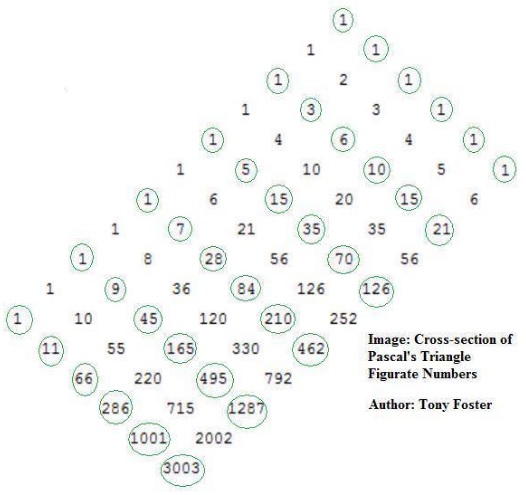Determinants in Pascal's Triangle
Tony Foster
November 6, 2016
Starting with the sequences of figurate numbers in Pascal's triangle, we reveal, via determinants, triangular numbers as exponents with base $2.$

Below are several examples with $\displaystyle T_{n}=\sum_{k=1}^nk=\frac{n(n+1)}{2},$ the $n^{\text{th}}$ triangular number.
$\displaystyle \begin{align} &\left|\begin{array}{cc}1&1\\1&3\end{array}\right|=2=2^1=2^{T_1}\\ \,\\ &\left|\begin{array}{ccc}1&1&1\\1&3&6\\1&5&15\end{array}\right|=8=2^{1+2}=2^{T_2}\\ \,\\ &\left|\begin{array}{cccc}1&1&1&1\\1&3&6&10\\1&5&15&35\\1&7&28&84\end{array}\right|=64=2^{1+2+3}=2^{T_3}\\ \,\\ &\left|\begin{array}{ccccc}1&1&1&1&1\\1&3&6&10&15\\1&5&15&35&70\\1&7&28&84&210\\1&9&45&165&495\end{array}\right|=1024=2^{1+2+3+4}=2^{T_4}\\ \,\\ &\left|\begin{array}{cccccc}1&1&1&1&1&1\\1&3&6&10&15&21\\1&5&15&35&70&126\\1&7&28&84&210&462\\1&9&45&165&495&1287\\1&11&66&286&1001&3003\end{array}\right|=32768=2^{1+2+3+4+5}=2^{T_5}\\ \end{align}$
The twitter user @mathforge has pointed out a paper Determinants of Matrices from Pascal's Triangle by Andrew Stacey with a much more general result.
Write Pascal's triangle in left-justified form, starting with $0\text{s}:$
$\left|\begin{array}{cccccc}1&0&0&0&0&\ldots\\1&1&0&0&0&\ldots\\1&2&1&0&0&\ldots\\1&3&3&1&0&\ldots\\1&4&6&4&1&\ldots\\&\ldots\end{array}\right|$
The table may also be expanded upwards using $\displaystyle {n \choose i}=-(1)^{i}{i-n-1\choose i},$ for negative $n.$ Then we have the following statement (Corollary 3.1 from the article):
Let $k\in\mathbb{N}$ and $l_1,\ldots,l_k,n_1,\ldots,n_k\in\mathbb{Z}.$ Let $B$ be the $(k+1)\times (k+1)$ matrix
$\displaystyle B=\left(\begin{array}{ccccc}1&n_1&{n_2\choose 2}&\ldots&{n_k\choose k}\\ 1&n_1+l_1&{n_2+l_2\choose 2}&\ldots&{n_k+l_k\choose k}\\ \ldots&\ldots&\ldots&\ldots&\ldots\\ 1&n_1+l_1k&{n_2+l_2k\choose 2}&\ldots&{n_k+l_kk\choose k}\end{array}\right),$
then $\displaystyle \det B=\prod_{i=1}^{k}l_i^{\,i}.$ In particular, if $l_i=1$ for all $i$ then $\det B=1$ and if $l_i=l$ for all $i$ then $\displaystyle \det B=l^{\frac{k(k+1)}{2}}.$
Pascal's Triangle and the Binomial Coefficients
- Binomial Theorem
- Arithmetic in Disguise
- Construction of Pascal's Triangle
- Dot Patterns, Pascal Triangle and Lucas Theorem
- Integer Iterations on a Circle
- Leibniz and Pascal Triangles
- Lucas' Theorem
- Lucas' Theorem II
- Patterns in Pascal's Triangle
- Random Walks
- Sierpinski Gasket and Tower of Hanoi
- Treatise on Arithmetical Triangle
- Ways To Count
- Another Binomial Identity with Proofs
- Vandermonde's Convolution Formula
- Counting Fat Sets
- e in the Pascal Triangle
- Catalan Numbers in Pascal's Triangle
- Sums of Binomial Reciprocals in Pascal's Triangle
- Squares in Pascal's Triangle
- Cubes in Pascal's Triangle
- Pi in Pascal's Triangle
- Pi in Pascal's Triangle via Triangular Numbers
- Ascending Bases and Exponents in Pascal's Triangle
- Determinants in Pascal's Triangle
- Tony Foster's Integer Powers in Pascal's Triangle
|Activities| |Contact| |Front page| |Contents| |Algebra|
Copyright © 1996-2018 Alexander Bogomolny
71544409
